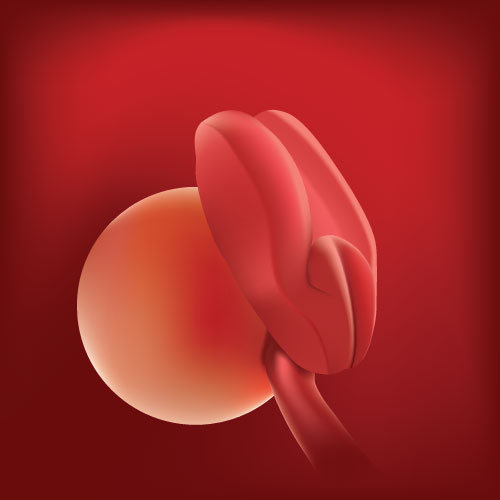How big is your baby?
The tiny ball of cells which is your baby’s first stage of development after conception is around the size of one grain of sand. It is going through some of the most miraculous changes that ever happen in biology – you have begun to create a human life.

How big is your baby?
The tiny ball of cells which is your baby’s first stage of development after conception is around the size of one grain of sand. It is going through some of the most miraculous changes that ever happen in biology – you have begun to create a human life.

What does your baby look like?
Invisible to the naked eye, your baby is a tiny cluster of cells which is yet to form into anything recognisable as a baby. But, once the sperm breaks through into your egg and this goes onto implant itself into your uterus, you could test positive for pregnancy (using an early response test), so, you could say, your baby looks like lines on a pregnancy test stick.
Changes in your body this week
If an egg has been fertilised there are some changes that you may notice such a watery vaginal discharge and sore breasts. And there are some you won’t necessarily notice, such as your baseline body temperature increasing slightly which is the result of a higher production of progesterone and oestrogen (hormones which ready your body for pregnancy.
How your baby will develop
After fertilisation, your egg turns into what is known as a zygote. This is a small structure which divides and multiplies incredibly quickly into a tiny collection of cells called a blastocyst. This will then travel down your fallopian tube and implant into your uterus to continue developing.
A word of warning here though, not all fertilised eggs will be carried to term and you may still have a period which will take the blastocyst with it.
Important issues this week
From this week onwards, it’s possible to get a positive result on a pregnancy test. But seeing as you haven’t actually missed your period yet, it would have to be an ‘early response’ test which is a super sensitive one designed to detect very tiny amounts of the pregnancy hormone hCG in your urine.
If you’re choosing to test early, remember to use first morning urine. It’s likely to be much more concentrated and therefore gives the test a better chance of recognising the hCG. Sensitivity of these tests is measured in mIU (milli-international unit per millilitre), with 10mIU being the most sensitive and 40mIU being the least.
One thing to be aware of though, is that not all fertilised eggs go on to become viable embryos. Many very early pregnancies will, for a vast number of reasons, result in a period. Although we understand how thrilling it is to know as early as possible if you could be pregnant, to be on the safe side, it’s best to wait until you are certain you have missed a period before taking a test.
Health concerns
A lot of pregnant women are conditioned to believe that any bleeding in pregnancy is bad news. This is not necessarily the case. Women bleed for many reasons and go on to have totally healthy pregnancies. Around week 3, it is perfectly normal to experience ‘implantation’ bleeding. This is exactly as it sounds and it’s often mistaken as the start of menstruation. It is actually a result of a miniscule amount of the endometrium being lost as the blastocyst implants. It can be experienced as anywhere between heavy bleeding or light spotting and can occur from day 6 to two weeks after conception.

Are there any symptoms you should be looking out for?
At this stage in your first trimester you may start to experience the early symptoms of pregnancy. These include the well known ones such as extreme fatigue and nausea, but it’s also common to go off certain foods, or smells, to have a metallic taste in your mouth which affects the way you taste food and from very early on your breasts may start enlarging – so watch out for red lines caused by an over-tight bra.
Safety first
If you actively trying to get pregnant, you may be wondering whether it’s safe to continue eating peanuts. There has been a lot of advice about this issue over recent years, with the Government advising at one stage that anyone with a family history of allergies (think eczema, asthma, hayfever) should avoid eating peanuts at all as it may cause their child to have a nut allergy. However, from 2009, a lack of evidence to back this up meant the guidelines have been clear – there is no reason to avoid peanuts during pregnancy – unless, of course, you yourself are allergic to them.
Keeping fit, staying healthy
Your body has just embarked on a huge task and a good diet is key. Try to eat plenty of foodstuffs containing protein and iron, such as fortified cereals, nuts, beans, eggs, lean meat and chicken, and leafy green vegetables such as spinach and kale.
Looking forward; planning ahead
Keep a special eye on your dates and write down the ones that you may be more certain of, such as the first day of your last period, a projected ovulation day and the day your period would be due. These will mean it’s easier to track your cycle and the progress of your pregnancy.
It’s also worth investing in a couple of high quality pregnancy tests so that when the time does come, you’ll be able to be certain it’s a positive result more quickly.



